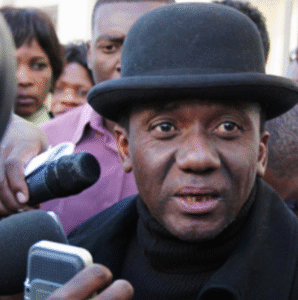CONDEMNATION OF THE UNDUE IMPRISONMENT OF OPPOSITION CHIEF, JACOB NGARIVHUME, UNDERLINES DEEPENING ASSAULT ON DISSENTING VOICES IN ZIMBABWE
The recent decision to incarcerate opposition luminary, Jacob Ngarivhume, for 48 months, on the grounds of inciting public unrest, simply underscores his exercise of free speech and peaceful congregation. This reveals a rising onslaught against voices of dissent. Sharing her perspective on the matter, Vongai Chikwanda, the acting Deputy Director for Southern Africa at Amnesty International, expressed her concern.

Jacob Ngarivhume is now confronting the prospect of spending four years behind bars, with a quarter of the term suspended, as a result of his role in orchestrating and leading a non-violent demonstration in July 2020. The protest was against corruption and the deprivation of socio-economic rights to Zimbabwe’s population. It is shocking to comprehend that Ngarivhume is facing such punishment for exercising his rights to free speech and peaceful assembly – rights that are enshrined in the country’s constitution.
It is an urgent call for authorities to reconsider and annul this punishment. The sentencing of Ngarivhume comes across as a manipulative strategy to suppress opposition, utilizing the judicial system as a tool for intimidating and quashing dissident voices.
Jacob Ngarivhume’s conviction and subsequent sentencing depict a burgeoning suppression of opposition leaders, advocates for human rights, activists, journalists, and other voices that dare to critique and dissent. This growing trend raises concerns over the misuse of legal systems. It is a clear case of authorities weaponising the law as a means to target figures from the opposition, as well as those who courageously voice their disapproval against rampant corruption.
The charges against Ngarivhume highlight the lengths authorities are willing to go to silence dissent, targeting individuals who dare to exercise their constitutional rights. It is an alarming testament to the democratic erosion happening in Zimbabwe, where freedom of expression and assembly, cornerstones of a democratic society, are being brutally suppressed.
The heavy sentence levied against Ngarivhume is a chilling reminder of the cost of speaking out against corruption and injustice in the country. The use of state power to silence opposition voices is a worrying trend that threatens the fabric of democracy in Zimbabwe. The call from Amnesty International for the quashing of this sentence is a call for justice, for the safeguarding of freedom of expression, and for the respect of individual rights.
In a society where the rule of law should reign supreme, the manipulation of legal systems to punish opposition voices is an appalling betrayal of democratic principles. It is a stark reminder of the need for constant vigilance against the abuse of power, especially when that power is used to silence voices that seek to expose corruption and demand justice.
The situation is a pressing wake-up call for international observers and allies of democracy to look more closely at the Zimbabwean government’s practices. These practices indicate an alarming disregard for basic human rights, especially freedom of expression and peaceful assembly, as tools for promoting transparency and accountability.
The conviction and sentencing of Jacob Ngarivhume are emblematic of a broader, growing crackdown on opposition figures, human rights defenders, and critical dissenting voices in Zimbabwe. It is a chilling reminder of the lengths authorities are willing to go to silence those who dare to speak out against corruption and injustice. It calls for urgent action from local and international bodies to ensure the protection of fundamental human rights and democratic values.




